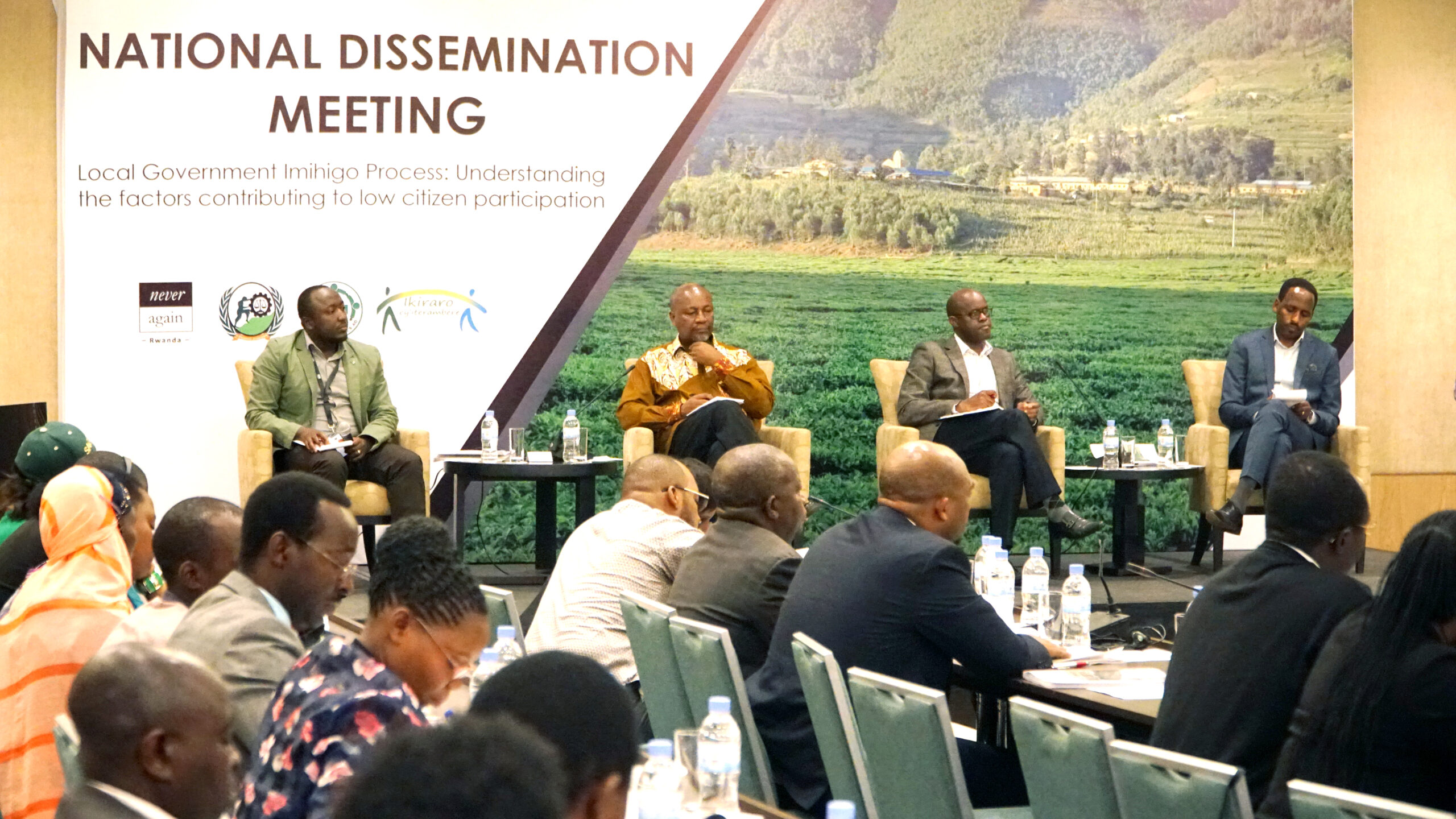As part of the Government’s efforts geared towards reconstructing Rwanda and nurturing a shared national identity, a set of Home Grown Solutions – culturally owned practices translated into sustainable development programs were introduced and one of them was Imihigo. Since 2016, the home-grown governance policy, Imihigo has been credited with improving accountability and accelerating citizen-centered development and quality implementation of the national programs. However, for imihigo to continue improving effective and accountable implementation of local and national programs, a high level of citizen participation in its entire process (formulation, implementation, monitoring, review and evaluation) is required, yet, several studies conducted over the past years have consistently shown that, except in the implementation phase, citizen participation in other phases of imihigo process is low, even lower than 50%.
It is against this background that Never Again Rwanda (NAR) in partnership with Youth Association for Human Rights Promotion and Development AJPRODHO-JIJUKIRWA, used a qualitative research approach to examine why citizen participation in Imihigo is low and to understand what needs to be done in order to improve the rate at which citizens participate in Imihigo processes. The findings of the 7-month study that covered 15 districts were presented to key stakeholders in the participatory governance field, this Tuesday.
In his opening remarks, the Executive Director of Never Again Rwanda, Dr. Joseph Ryarasa Nkurunziza highlighted the importance of Citizen Participation for good governance. He called upon all stakeholders to combine efforts in supporting the participation of citizens in Imihigo planning and preparation. He noted that “Citizen Participation in Imihigo is at the core of good governance, the main aim of the research is to generate ideas that can contribute to improving policy making hence, national development”.
Key findings, hindering factors, and recommendations
The key hindering issues highlighted are limited capacity (approaches, tools, methodology) by local leaders and aides to genuinely engage citizens in public decisions, some citizens are not aware of own participation as a right and duty while most citizens & some local leaders are not generally knowledgeable about Imihiigo processes.
Some of the recommendations are not limited to; the Ministry of Local Government, MINALOC to establish and institutionalize social audits to cross-check tangible evidence concerning whether or not genuine citizen participation in the entire imihigo process effectively takes place; districts to revise the time (from day time/working hours) of Inteko y’abaturage to enable citizens in formal employment and those in urban areas to also participate while CSO’s to build the capacity to generate research-driven data and conduct evidence-based advocacy.
What does the research mean to Imihigo now?
Director General of Rwanda Management Institute (RMI), Wellars Gasamagera noted that this research is a milestone to gain deeper understanding on gaps that hamper effective citizen participation and provide possible remedies to enhance the people’s participation in local governments’ Imihigo processes.
Dr. Félicien Usengumukiza, Head of Governance Research and Monitoring Department at the Rwanda Governance Board (RGB) applauded one of the recommendation of the research that called for the establishment of a legal framework which binds local government to genuinely engage citizen in imihigo through receiving their ideas and providing feedbacks noting that “Before the budget is presented, we should give a space to citizens to voice their needs but also give them feedback on our priorities”.
In his concluding remarks, Executive Director of AJPRODHO-JIJUKIRWA, Antony Busingye lauded the existing mechanisms that work towards citizen participation. He mentioned that this research will support by addressing the gaps hindering Citizen participation in local government stating that “We have a lot of initiatives that work to address the needs of citizens, we do believe that progress has been made in citizen participation but we must continue to tackle the existing gaps with the research so that we can continue to foster citizen participation”.
While officiating at the annual Imihigo signing ceremony for the 2017-2018 Financial Year, President Paul Kagame noted that Imihigo is about transforming the lives of every citizen. Hinged on the study findings, transformation can only be guaranteed if the citizens themselves are engaged in the entire imihigo process.


